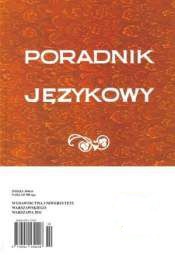MACEDOŃSKIE ŠETANJE, CZYLI O RÓŻNICACH ZNACZEŃ SŁÓW UWARUNKOWANYCH PŁCIĄ
Macedonian šetanje – on the differences in meaning of the words conditioned by gender
Author(s): Karolina Bielenin-LenczowskaSubject(s): Language and Literature Studies
Published by: Dom Wydawniczy ELIPSA
Keywords: etymologia; znaczenie; słownictwo; Macedonia; język macedoński; Šeta; płeć; gender studies;
Summary/Abstract: The article presents the analysis of a macedonian word šeta (to walk, to visit), which has different meanings depending on gender and maritial status of a person it refers to. If a young man šeta, it means that he appears in different places to parade himself, e.g. to show a new dress or a cell phone and to present oneself as a potential candidate for husband. If a married man šeta, it means that he spends time in cafes and meets other people. The word can be negatively marked and understood as włóczyć się (to gad about), because a man’s duty is to provide for family and not squander money. If a woman šeta, especially a maiden, the word acquires sexual innuendo and connotes spending time with men. In reference to a married woman, there appear also meanings connected with thrift, laziness and gossip.
Journal: Poradnik Językowy
- Issue Year: 2010
- Issue No: 01
- Page Range: 102-108
- Page Count: 7
- Language: Polish
- Content File-PDF

